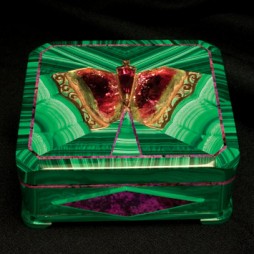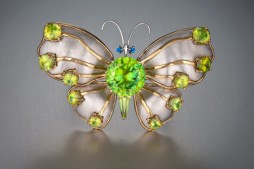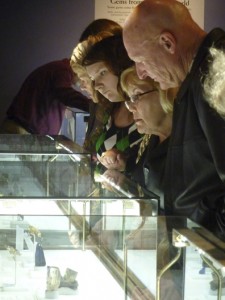All that glitters
A platinum crystal, a blue sapphire ring and an amethyst necklace are three of the nine gems that are currently on loan from the Natural History Museum’s Gem and Mineral Collection for the exhibition All That Glitters: The Splendor and Science of Gems and Minerals at the San Diego Natural History Museum. The exhibition combines natural mineral crystals with jewelry and other works of art to showcase both the science and the artistry of gems and minerals.

Intarsia Butterfly Box Created by Nikolai Medvedev. Malachite, sugilite, tourmaline and gold. Teakwood inlay. 10 x 9.2 cm. (Photo by Tom Spann)
“Opportunities like this exhibition are wonderful venues to show off our pieces to the public,” said Jeffrey Post, NMNH curator and geologist. “When we loan a piece to another museum, it has a chance to star on its own, instead of competing with the Hope Diamond.”
The exhibition also enables SDNHM, a Smithsonian Affiliate, to display its own gem and mineral collections, which had been in storage during building renovations and expansions.
“We brought in temporary exhibitions,” said Michael Hager, SDNHM president and CEO, “but we decided to devote that funding to an exhibition we created, and to not only look at specimens relevant to our region but also the larger world of gems and minerals.” Guest Curator Elise Misiorowski brought her extensive background in jewelry history to the exhibition. Four galleries bring together objects as varied as meteorites from outer space, the California state gem benitoite, a carved Fabergé pig with diamond eyes, and a hand-carved zebra.
“I wanted to contrast natural splendor with man-made splendor, as well as look at the art that follows nature,” Misiorowski said. “This information can be presented in so many ways, but by combining familiar items like jewelry with the science of crystal structures, I tried to make the exhibition both accessible and fun.”
This sense of fun permeates the exhibition, evidenced by a giant interactive periodic table illustrating all the elements comprising the gems. Animals are found throughout the exhibition in the guise of a jellyfish opal brooch, Cartier diamond panthers and tigers, and a set of 13 butterfly brooches set with alexandrite, rhodochrosite, and flame spinel. Another fun element is the name SAN DIEGO spelled out in diamond-encrusted letters. The letters, also on loan from NMNH, were personally packed by SDNHM staff member Chena Popper, who was assigned to the project as an Affiliations Visiting Professional during her residency in April 2010.

Green sphene butterfly brooch created by Buzz Gray and Bernadine Johnston. Thirteen butterfly brooches set with rare gems such as alexandrite, Mexican fire opal, pearls from Baja California, topaz, rainbow moonstone, sapphire and more are on display..
“We had to take each letter off a special mount and then pack them individually,” Popper explained. “It was a great training opportunity and I saw first-hand as the objects went from the Smithsonian to San Diego.” Post added, “The Visiting Professional project was very beneficial; knowing there was someone at the other end of the loan who knew how we packed our items and would unpack them just the way we like.”
In June, Misiorowski returned to the Smithsonian, this time to speak about her experience for the Smithsonian Affiliations National Conference. In the session, Partnering for Success: Getting the Most from Your Affiliation, she described the successful exhibition.
Post emphasized that the Affiliate relationship is a collaboration and a partnership. “Showing our objects in different parts of the country allows other people to tell different stories than we would tell. And sometimes, we learn a few things about our pieces that we didn’t know before.”
Posted: 8 March 2011
-
Categories:
Education, Access & Outreach , News & Announcements , Smithsonian Affiliations




